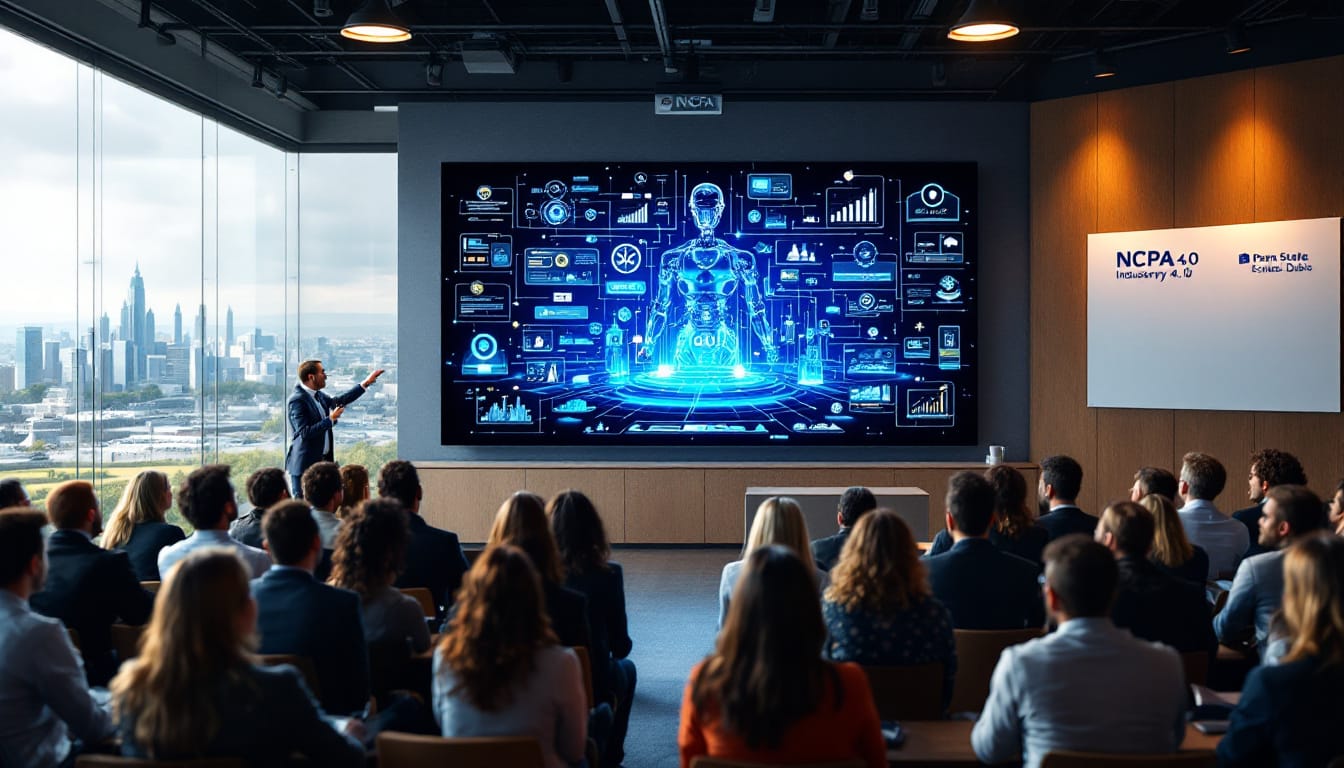“`html
The students of DuBois Area High School are diving into the future of technology.
Through the Industry 4.0 Academy Initiative, they are exploring cutting-edge fields.
Robotics, artificial intelligence, and cybersecurity are no longer mere abstract concepts.
This hands-on immersion opens the doors to careers in advanced manufacturing and innovative technologies. By combining theory and field experience, the program bridges the skills gap threatening workforce readiness. Students benefit from dynamic learning, essential for navigating the era of Industry 4.0.
The launch of the Industry 4.0 Academy by the North Central Pennsylvania (NCPA) LaunchBox and Penn State DuBois marks a significant milestone in preparing students for the technological future. This innovative initiative aims to equip high school students with the skills necessary to excel in the fields of advanced manufacturing and emerging technologies. By integrating disciplines such as robotics, automation, artificial intelligence (AI), and cybersecurity, the academy offers a comprehensive training tailored to the demands of modern industry.
Table des matières
ToggleWhat are the goals of the Industry 4.0 Academy?
Industry 4.0 represents the fourth industrial revolution, characterized by the integration of digital technologies into production processes. The academy mainly aims to bridge the skills gap by providing students with practical and theoretical education that meets the current needs of industries. Participating high school students benefit from an immersive experience, allowing them to familiarize themselves with cutting-edge tools and concepts such as robotic arms, automation simulations, and AI applications for data analysis.
According to Wendy Benton, superintendent of the DuBois Area School District, “The partnership between Penn State DuBois and the NCPA LaunchBox represents an extraordinary investment in our students and the broader community. By introducing high school students to Industry 4.0 technologies, this program not only ensures their preparedness for the future but also their role as leaders in shaping it.”
How does the academy bridge the skills gap?
The skills gap is a major concern for many industries, ranging from manufacturing to healthcare, which increasingly rely on smart technologies. The Industry 4.0 Academy addresses this challenge by providing students with a combination of theoretical knowledge and practical skills essential to meet the demands of modern work environments. Students not only earn continuing education certifications every nine weeks but also explore emerging career opportunities through a pilot program designed for six participants.
Lucian Barnett, one of the students, shares: “I learned about the technology that influences my daily life, but I had never had the chance to gain hands-on experience with it.” This hands-on approach is crucial for preparing students to enter the workforce with an edge.
What advantages does hands-on learning offer students?
Hands-on learning is at the heart of the Industry 4.0 Academy. Unlike traditional classes, the program emphasizes experimentation and the direct application of knowledge. Students program and operate robotic arms, participate in realistic automation simulations, explore threats and defenses in cybersecurity, and develop AI applications for data analysis. This immersive approach allows learners to develop practical skills while enhancing their ability to solve complex problems.
Lillian Kakabadze, a program participant, states: “It’s refreshing to try something new while benefiting from practical, personalized instruction. The confidence in our ability to learn these new technologies is unmatched.”
Furthermore, the academy fosters a critical thinking and innovation mindset, essential for anticipating and adapting to future technological advancements. This training enables students to become proactive contributors in the Industry 4.0 field, capable of delivering innovative solutions to emerging challenges.
What is the importance of cybersecurity in the program?
With the increasing digitization of industries, cybersecurity has become a crucial element in the protection of data and computer systems. The Industry 4.0 Academy integrates cybersecurity modules covering essential aspects such as ethical hacking, data protection, and risk management. These skills are indispensable for ensuring the safety and resilience of technological infrastructures across various sectors.
Clarence Mowrey, another participant, shares his experience: “Before this program, I didn’t realize how much our world depends on cybersecurity. Every part of this program has given me insights that I find useful in my daily life.”
By exploring the fundamental principles of cybersecurity, students gain a deep understanding of potential threats and defense strategies, thus preparing them to protect digital resources in their future careers.
Integration of cybersecurity in the curriculum
The academy offers specific workshops and projects focused on cybersecurity, allowing students to apply their knowledge in controlled environments. This hands-on immersion fosters better absorption of concepts and prepares students to tackle real-world cybersecurity challenges in the professional realm.
How does the community support this initiative?
The success of the Industry 4.0 Academy largely relies on the support and collaboration of the local community. Penn State DuBois and the NCPA LaunchBox have worked closely with the DuBois Area School District to create a program that meets the specific needs of the region. This strategic alliance ensures that resources and expertise are effectively mobilized to provide quality training to students.
Brad Lashinsky, program director, emphasizes: “It is through innovative solutions and the utilization of the resources of Penn State DuBois, the NCPA LaunchBox, and partnerships like the Applied AI Consortium that pilot programs like this can succeed. We look forward to the future of this program and the impact it will have on educating the next generation of the workforce.”
The community support extends beyond education. It also contributes to regional economic growth, enhancing the competitiveness of local businesses and creating quality job opportunities for the academy’s graduates.
What are the commitments to workforce development?
The commitment to workforce development lies at the heart of the initiative by Penn State DuBois and the NCPA LaunchBox. By launching the Industry 4.0 Academy, these institutions demonstrate their willingness to support economic growth and to meet the ever-changing needs of regional industries. The program not only educates students; it creates pathways to high-demand, well-paying careers.
Jungwoo Ryoo, chancellor and academic director, expresses his pride: “At Penn State DuBois, workforce development is not just a program; it’s an essential mission, a vital bridge connecting our students to the future. I am extremely proud to see our campus taking the lead in preparing our community for the Industry 4.0 revolution through this new academy.”
Future plans include expanding the program to offer more opportunities to students from other regional school districts. Participants will visit campus three days a week for hands-on learning while completing complementary exercises outside of the classroom, thereby ensuring ongoing and flexible training.
How to enroll and learn more about the academy?
Schools interested in future editions of the Industry 4.0 Academy can contact Brad Lashinsky for more information. To learn more about the NCPA LaunchBox powered by Penn State DuBois, visit their website.
This exemplary initiative illustrates how a close collaboration between educational institutions and industrial partners can catalyze the development of skills necessary to thrive in the era of Industry 4.0. By investing in young talent and providing them with the tools necessary to succeed, Penn State DuBois and the NCPA LaunchBox are laying the groundwork for a promising future for the region and its industries.
For a complex perspective on Industry 4.0, check out this article. Also discover how to make Industry 4.0 accessible to all discrete product manufacturers, or listen to the manufacturers’ podcast to learn more about current challenges.





